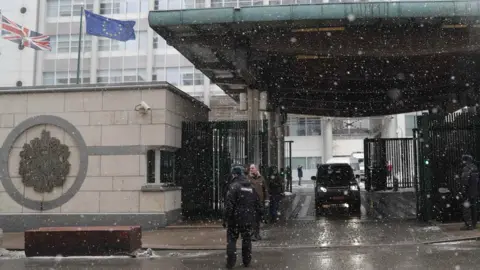Russian spy: EU recalls Russia ambassador after nerve agent attack
The EU has recalled its ambassador to Moscow after leaders agreed it was "highly likely" Russia was responsible for a nerve agent attack in the UK.
The European Council of EU leaders said there was "no plausible alternative".
Moscow denies responsibility for the attack on an ex-spy and his daughter and said the EU was following an "anti-Russian campaign launched by London".
Meanwhile, British diplomats expelled from Russia have left the embassy in Moscow ahead of Russia's deadline.
Russia decided to expel the British diplomats in a tit-for-tat response to the UK's expulsion of 23 of its diplomats.
Former Russian spy Sergei Skripal and his daughter Yulia remain in a critical but stable condition after the attack on 4 March.
UK Prime Minister Theresa May welcomed the EU support, saying that it was right "we are standing together" as the threat posed by Russia "respects no borders and it is a threat to our values".
The EU said its ambassador to Russia, German Markus Ederer, was recalled "for consultations" and was expected in Brussels over the weekend.
The European Council statement added: "We stand in unqualified solidarity with the United Kingdom in the face of this grave challenge to our shared security."
 Reuters
ReutersIn response, Russia's foreign ministry said: "We regret that the EU chose to follow another anti-Russian campaign launched by London and its allies from across the ocean, with the obvious purpose of creating yet another obstacle to normalising the situation on the European continent."
Mrs May briefed her counterparts on Thursday on the poisoning of the Skripals, who were found unconscious on a bench in Salisbury.
The prime minister set out the evidence the UK has against Russia - including the positive identification of the chemical used as a type of Novichok nerve agent and the knowledge that Russia has produced this agent within the last 10 years.
Asked if she had relied on UK intelligence information to convince EU allies, Mrs May said the UK had been sharing "throughout" the investigation "what intelligence we can share with our colleagues".
She said: "What is crucial is that there was recognition around the table about the threat that Russia poses."

Analysis
By Laura Kuenssberg, BBC political editor
It might not sound much, but a few small words can make a big difference.
The president of the European Council has used the prime minister's language about the Salisbury attack, accepting and agreeing with the British verdict that there is no other "plausible" explanation for what happened.
That is a small, but significantly different, tone to the statement a few days ago.
EU ministers would only say: "The European Union takes extremely seriously the UK government's assessment that it is highly likely that the Russian Federation is responsible."
The sentiment then was, OK, it might have been them - but you haven't convinced us yet.

Irish Prime Minister Leo Varadkar said he supported the EU's position "very strongly" and Ireland could expel Russian officials if they were shown to be acting as intelligence agents.
He said there would be a security assessment in the coming days with a decision as early as next week.
Lithuania, Czech Republic and Latvia have also said they were considering expelling suspected Russian spies from their countries.
But Greek PM Alexis Tsipras said that while he wanted to "express solidarity" with Britain, "we also need to be responsible on that issue".

Why does the EU have ambassadors?
The European Union has a network of 140 delegations around the world which represent the EU abroad.
The EU nominates ambassadors to those embassies. They play a key role in presenting, explaining and implementing the EU's foreign policies to their host country.
The current EU ambassador to Russia is German diplomat Markus Ederer, who has previously been responsible for China and Mongolia.
